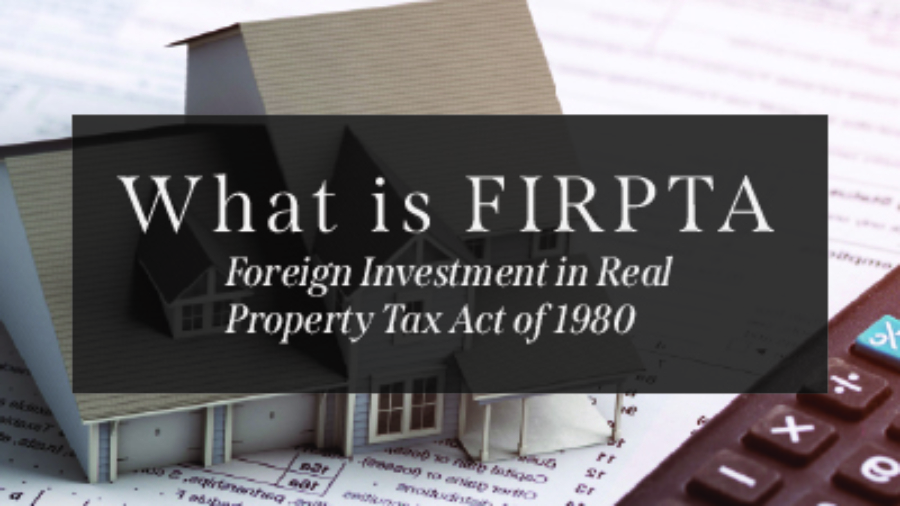FIRPTA, or the Foreign Investment in Real Property Tax Act of 1980, imposes an income tax on foreign individuals or entities selling U.S. real property.
If the foreign seller has unpaid income tax, a lien may be placed on the buyer’s property, making the buyer liable for the unpaid tax.
Foreign individuals or entities selling property should consult a CPA or tax advisor before listing their property to determine if FIRPTA applies to their transaction. The CPA or tax advisor can assist the seller in obtaining necessary documents, such as the Non-Foreign Affidavit or Withholding Certificate, which may be required by the contract. They can also explain the withholding process and potential exemptions.
Republic Title of Texas is not responsible for determining whether the transaction is subject to FIRPTA withholdings.
Below are helpful links from the IRS to learn more about this Act and ways to obtain an Individual Tax Identification Number, apply for a W-7 and fill out the W-7 form:
• irs.gov/Individuals/International-Taxpayers/FIRPTA-Withholding
• irs.gov/Individuals/ITIN-Guidance- for-Foreign-Property-Buyers-Sellers
• irs.gov/pub/irs-pdf/iw7.pdf
• irs.gov/pub/irs-pdf/fw7.pdf
FIRPTA Q&A
Q: Who is responsible for FIRPTA withholding?
A: The buyer is responsible for withholding the potential for income tax under IRS regulations. This withholding is typically 10% or 15% of the purchase price when the property is sold by a Foreign Person. The real property serves as collateral to ensure the IRS receives the taxes due. If the buyer fails to make the payment, the IRS may seize the property or other assets or the buyer.
Q: Can’t the buyer assign the responsibility for withholding to the settlement or escrow agent?
A: No, IRS regulations do not allow the buyer to transfer their withholding responsibility to anyone, including the escrow or real estate agents. Escrow agents are not authorized to offer legal or tax advice.
Q: The seller is foreign, but has a social security number. We’re okay right?
A: Foreign citizens doing business and earning income in the United
These look similar to social security numbers. The test of whether FIRPTA withholding is required or not, is a statement made by the seller under penalty of perjury that they are not a non-resident alien for purposes of U.S. income taxation.
Q: What is a “non-resident alien” for purposes of U.S. income taxation?
A: Another way to explain that (although it may not cover all situations) is that the seller must either be a U.S. citizen or resident alien with a green card.
Q: The seller is taking a loss on their home. They don’t need to pay FIRPTA withholding, right?
A: No automatic exemption exists under FIRPTA for sellers taking a loss or realizing no gain. If a foreign seller believes they are exempt because they are not making a profit, they should consult with a tax professional. They may need to apply for a Withholding Certificate from the IRS using Form 8288-B. The seller should apply for this prior to listing the property to avoid delays.
Q: The seller lives in another country, but says they are a U.S. citizen. Isn’t withholding required?
A: U.S. citizens may be living in other countries. Current residency is not a good indication of FIRPTA status.
Q: A foreign seller doesn’t have a TIN and is willing
to pay the IRS. Can the money just be sent to the
IRS without a TIN?
A: No, the IRS requires that sellers of real property have TINs.
Q: A foreign seller only owns a portion of the property. How much money does the foreign seller owe?
A: The foreign seller is responsible for withholding on their share of ownership in the property. They should consult with a tax professional to determine the amount due.
Q: The property is under $300,000 and the buyer
is going to live in it. Doesn’t that automatically exempt it from withholding?
A: If the witholding was overpaid, the seller can apply for a refund through the IRS, but they may need to file specific forms and consult a tax expert.
Q: Isn’t a transaction from a foreign seller to a
foreign buyer exempt from withholding?
A: No. While the individuals are both Foreign Persons, the tax is an income tax unique to the individual.
Q: The FIRPTA withholding was paid at close of escrow, but not that much money was due to the IRS. How does the seller get their money back?
A: The seller can either in advance of closing file an 8288-B Application for Withholding Certificate to request a reduced amount or no withholding. The seller can also file a tax return the following year to obtain any refund due. A CPA or other tax expert should be consulted for guidance.
Q: The seller and buyer don’t want to pay a CPA to answer their questions. Can’t the real estate person or escrow person help with FIRPTA questions?
A: Escrow personnel and real estate agents may have experience
taxpayer’s situations.






















